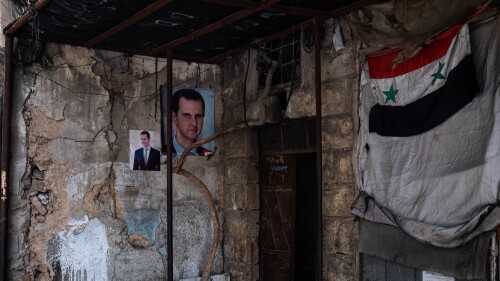For about a year, Republicans and Democrats agreed on the need vigorously to prosecute the war on terror.
No longer. Nearly all the Democratic presidential contenders as well as other heavyweight Democrats have spoken out against the war on terror, preferring it to be a police action against terror.
- Howard Dean, replying to a question that if bin Laden should be caught, whether to put him to death: “I’ve resisted pronouncing a sentence before guilt is found. I still have this old-fashioned notion that even with people like Osama, who is very likely to be found guilty, we should do our best not to, in positions of executive power, not to prejudge jury trials.” (Some days later, under criticism, Dr. Dean shifted his position, saying “as an American I want to see he gets what he deserves, which is the death penalty.”)
- Richard Gephardt: “I never felt it was inevitable that we had to go to war.”
- John Kerry: President George W. Bush wrongly “rushed into battle.”
- George Soros: “the war on terrorism cannot be won by waging war. … Crime requires police work, not military action.”
- William Sloan Coffin: After 9/11, the U.S. government should have vowed “to see justice done, but by the force of law only, never by the law of force.”
Fully to appreciate the significance of the Democrats’ views requires some background: Although Islamist violence against Americans began in 1979, for 22 years the U.S. government, regardless of which party was in charge, insisted on reducing the Islamist threat to its criminal component.
Because evidence against Iran would not have passed muster in a court of law, for example, the destruction of the U.S. embassy in Beirut in April 1983, killing 63, went unavenged. The U.S. response in 1998 to two embassy bombings in East Africa, killing 224, was to track down the perpetrators, haul them before a court in New York, win convictions, and put them away. There was no effort to dismantle the command and control structure, the financial institutions, the cultural milieu, or the political ideology that had bred the violence.
Then came September 11 and a nationwide realization that the country faced not just crime but also a military threat. That very evening, Mr. Bush declared a “war against terrorism.” A war, note — not a police action.
This new approach quickly had large implications. One was deploying the military to destroy the Taliban regime. Another (via the Patriot Act) was pulling down the “firewall” dividing law enforcement and intelligence agencies.
This latter may sound technical, but it greatly enhanced American capabilities. For years, legal investigators pursued information that their colleagues in the intelligence agencies already had. It was like “having your best football players sitting on the bench when you are having your butts beat,” notes Barry Carmody, an FBI agent who worked on the Sami Al-Arian terrorism case. Then the Patriot Act was passed and “Everything changed.” Now, the authorities could “gamble with 52 cards, not half the deck,” Mr. Carmody said.
“Holy moley! There’s a lot there!” was how another FBI agent, Joe Navarro, characterized the flood of new information in the Al-Arian case. He described getting hold of it as “one of those awesome moments.”
Two months ago, the undersecretary of defense for policy, Douglas Feith, formally contrasted the pre- and post-9 /11 approaches: think back, he suggested, to the 1993 World Trade Center bombing and to the attacks on Khobar Towers in 1996, on the U.S. East African embassies in 1998, on the U.S.S. Cole in Yemen in 2000. When such attacks occurred over the last decades, U.S. officials avoided the term “war.” The primary response was to dispatch the FBI to identify individuals for prosecution. Recognizing the September 11 attack as war was a departure from the established practice. It was President Bush’s seminal insight, the wisdom of which I would say is attested by the fact that it looks so obvious in retrospect.
Obvious for a while, yes. Now, key Democrats repudiate this insight and insist on a return to the pre-9 /11 dispensation.
Doing so would amount to a momentous step backwards, however. This new kind of war involves criminality, to be sure, but it still is war. To unlearn the painful lesson of September 11 is a good way to lose that war.
Further quotes from prominent Democrats:
Harold Hongju Koh, Gerard C. and Bernice Latrobe Smith Professor of International Law, Yale Law School: "[Bush] could have supported the International Criminal Court as a way of bringing the Osama bin Ladens and Saddam Husseins of the world to justice.” (The Economist, October 30, 2003)







